
chatgpt-webui
ChatGPT WebUI using gradio. 给 LLM 对话和检索知识问答RAG提供一个简单好用的Web UI界面
Stars: 79
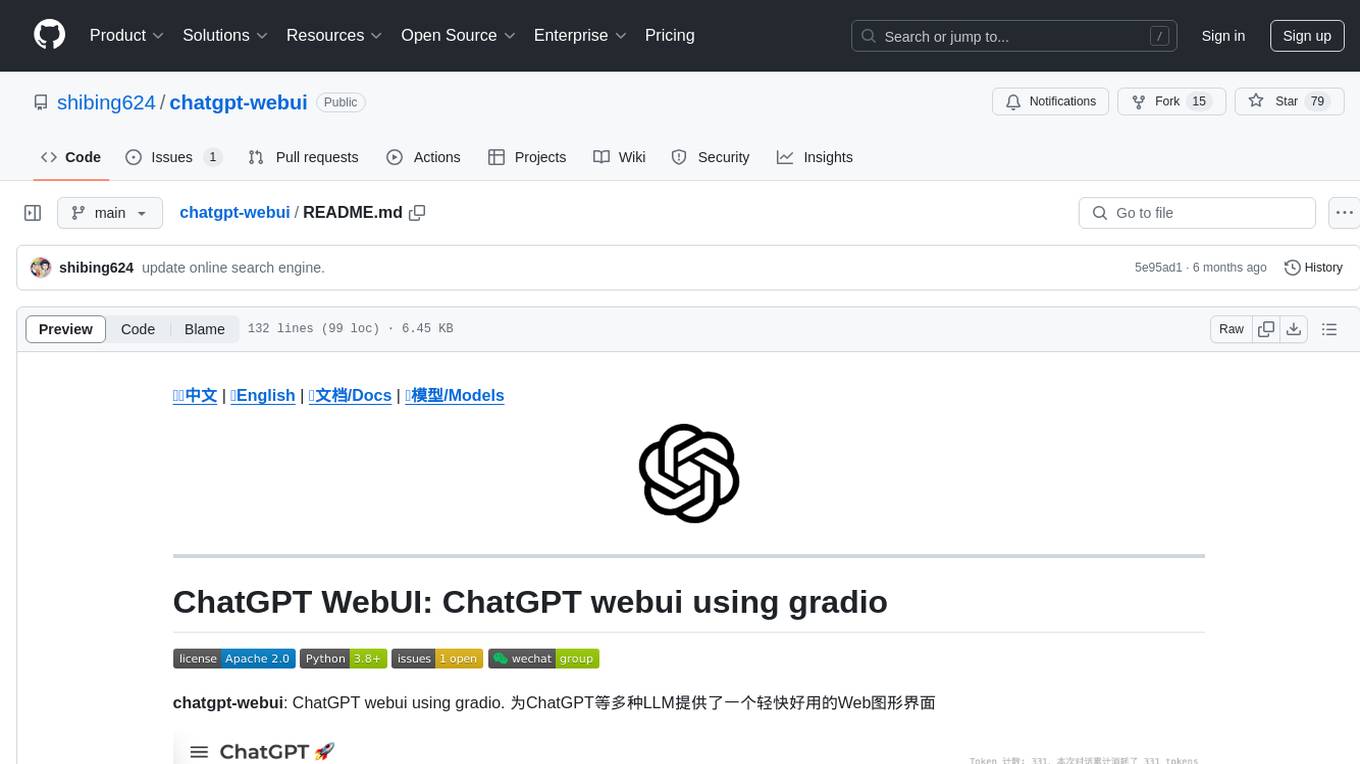
ChatGPT WebUI is a user-friendly web graphical interface for various LLMs like ChatGPT, providing simplified features such as core ChatGPT conversation and document retrieval dialogues. It has been optimized for better RAG retrieval accuracy and supports various search engines. Users can deploy local language models easily and interact with different LLMs like GPT-4, Azure OpenAI, and more. The tool offers powerful functionalities like GPT4 API configuration, system prompt setup for role-playing, and basic conversation features. It also provides a history of conversations, customization options, and a seamless user experience with themes, dark mode, and PWA installation support.
README:
🇨🇳中文 | 🌐English | 📖文档/Docs | 🤖模型/Models
chatgpt-webui: ChatGPT webui using gradio. 为ChatGPT等多种LLM提供了一个轻快好用的Web图形界面
本项目基于 ChuanhuChatGPT 简化而来,主要改动如下:
- 简化了WebUI页面,只保留核心的ChatGPT对话(LLM)、文档检索对话(RAG)功能,去除了midjourney等功能
- 重构了代码逻辑和结构,规范python语法,轻量化项目依赖库
- 保留本地大语言模型对话,方便扩展本地模型
- 支持nginx反向代理,静态文件使用相对路径,方便部署
- 提升RAG检索准确率
- 引入jieba分词的rank_BM25,提升对query关键词的字面匹配,使用字面相似度+sentence embedding向量相似度加权获取corpus候选集
- RAG底模优化,使用基于RAG微调的模型
- Chinese chunk切分优化
- 优化了在线搜索功能,支持DuckDuckGo、Google、Bing、Serper等搜索引擎,提升搜索准确率
- GPT4 API:基于代理配置GPT4 API,支持多用户对话;
- 本地部署LLM:一键部署,获取属于你自己的大语言模型。
- 通过 System Prompt 设定前提条件,可以很有效地进行角色扮演;
- 川虎Chat 预设了Prompt模板,点击
加载Prompt模板,先选择 Prompt 模板集合,然后在下方选择想要的 Prompt。
- 如果回答不满意,可以使用
重新生成按钮再试一次,或者直接删除这轮对话; - 输入框支持换行,按 Shift + Enter即可;
- 在输入框按 ↑ ↓ 方向键,可以在发送记录中快速切换;
- 每次新建一个对话太麻烦,试试
单论对话功能; - 回答气泡旁边的小按钮,不仅能
一键复制,还能查看Markdown原文; - 指定回答语言,让 ChatGPT 固定以某种语言回答。
- 对话历史记录会被自动保存,不用担心问完之后找不到了;
- 多用户历史记录隔离,除了你都看不到;
- 重命名历史记录,方便日后查找;
- New! 魔法般自动命名历史记录,让 LLM 理解对话内容,帮你自动为历史记录命名!
- New! 搜索历史记录,支持正则表达式!
- 自研 Small-and-Beautiful 主题,带给你小而美的体验;
- 自动亮暗色切换,给你从早到晚的舒适体验;
- 完美渲染 LaTeX / 表格 / 代码块,支持代码高亮;
- New! 非线性动画、毛玻璃效果,精致得不像 Gradio!
- New! 适配 Windows / macOS / Linux / iOS / Android,从图标到全面屏适配,给你最合适的体验!
- New! 支持以 PWA应用程序 安装,体验更加原生!
- 大量 LLM 参数可调;
- 支持更换 api-host;
- 支持自定义代理;
- 支持多 api-key 负载均衡。
- 部署到服务器:在
config.json中设置"server_name": "0.0.0.0", "server_port": <你的端口号>,。 - 获取公共链接:在
config.json中设置"share": true,。注意程序必须在运行,才能通过公共链接访问。 - 在Hugging Face上使用:建议在右上角 复制Space 再使用,这样App反应可能会快一点。
在终端执行以下命令:
git clone https://github.com/shibing624/chatgpt-webui.git
cd chatgpt-webui
pip install -r requirements.txt然后,在项目文件夹中复制一份 config_example.json,并将其重命名为 config.json,在其中填入 API-Key 等设置。
python main.py一个浏览器窗口将会自动打开,可以与ChatGPT或其他模型进行对话。
在遇到各种问题查阅相关信息前,您可以先尝试 手动拉取本项目的最新更改1 并 更新依赖库2,然后重试。步骤为:
- 点击网页上的
Download ZIP按钮,下载最新代码并解压覆盖,或git pull https://github.com/shibing624/chatgpt-webui.git main -f
- 尝试再次安装依赖(可能本项目引入了新的依赖)
pip install -r requirements.txt
很多时候,这样就可以解决问题。
如果问题仍然存在,请查阅该页面:常见问题
该页面列出了几乎所有您可能遇到的各种问题,包括如何配置代理,以及遇到问题后您该采取的措施,请务必认真阅读。
- Issue(建议)
:
- 邮件我:xuming: [email protected]
- 微信我: 加我微信号:xuming624, 备注:姓名-公司名-NLP 进NLP交流群(加我拉你进群)。
For Tasks:
Click tags to check more tools for each tasksFor Jobs:
Alternative AI tools for chatgpt-webui
Similar Open Source Tools

chatgpt-webui
ChatGPT WebUI is a user-friendly web graphical interface for various LLMs like ChatGPT, providing simplified features such as core ChatGPT conversation and document retrieval dialogues. It has been optimized for better RAG retrieval accuracy and supports various search engines. Users can deploy local language models easily and interact with different LLMs like GPT-4, Azure OpenAI, and more. The tool offers powerful functionalities like GPT4 API configuration, system prompt setup for role-playing, and basic conversation features. It also provides a history of conversations, customization options, and a seamless user experience with themes, dark mode, and PWA installation support.
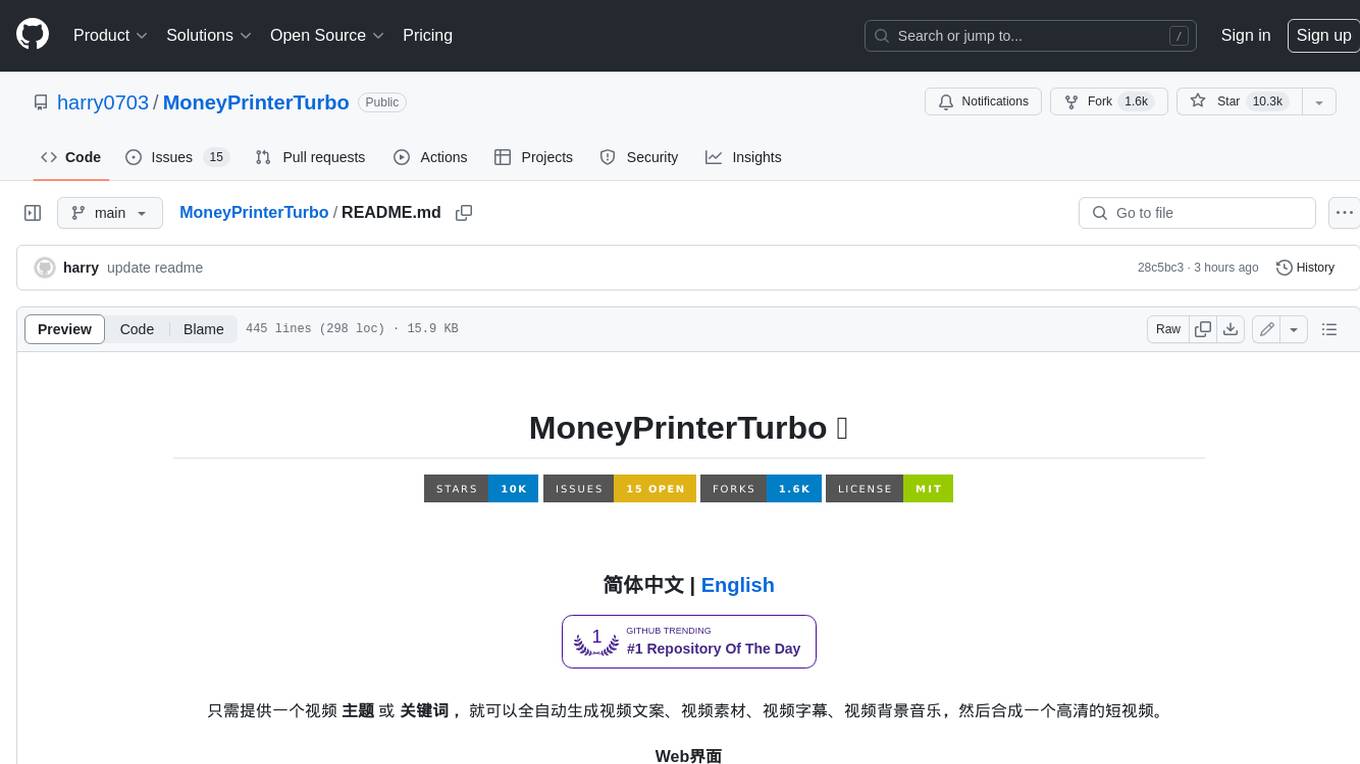
MoneyPrinterTurbo
MoneyPrinterTurbo is a tool that can automatically generate video content based on a provided theme or keyword. It can create video scripts, materials, subtitles, and background music, and then compile them into a high-definition short video. The tool features a web interface and an API interface, supporting AI-generated video scripts, customizable scripts, multiple HD video sizes, batch video generation, customizable video segment duration, multilingual video scripts, multiple voice synthesis options, subtitle generation with font customization, background music selection, access to high-definition and copyright-free video materials, and integration with various AI models like OpenAI, moonshot, Azure, and more. The tool aims to simplify the video creation process and offers future plans to enhance voice synthesis, add video transition effects, provide more video material sources, offer video length options, include free network proxies, enable real-time voice and music previews, support additional voice synthesis services, and facilitate automatic uploads to YouTube platform.
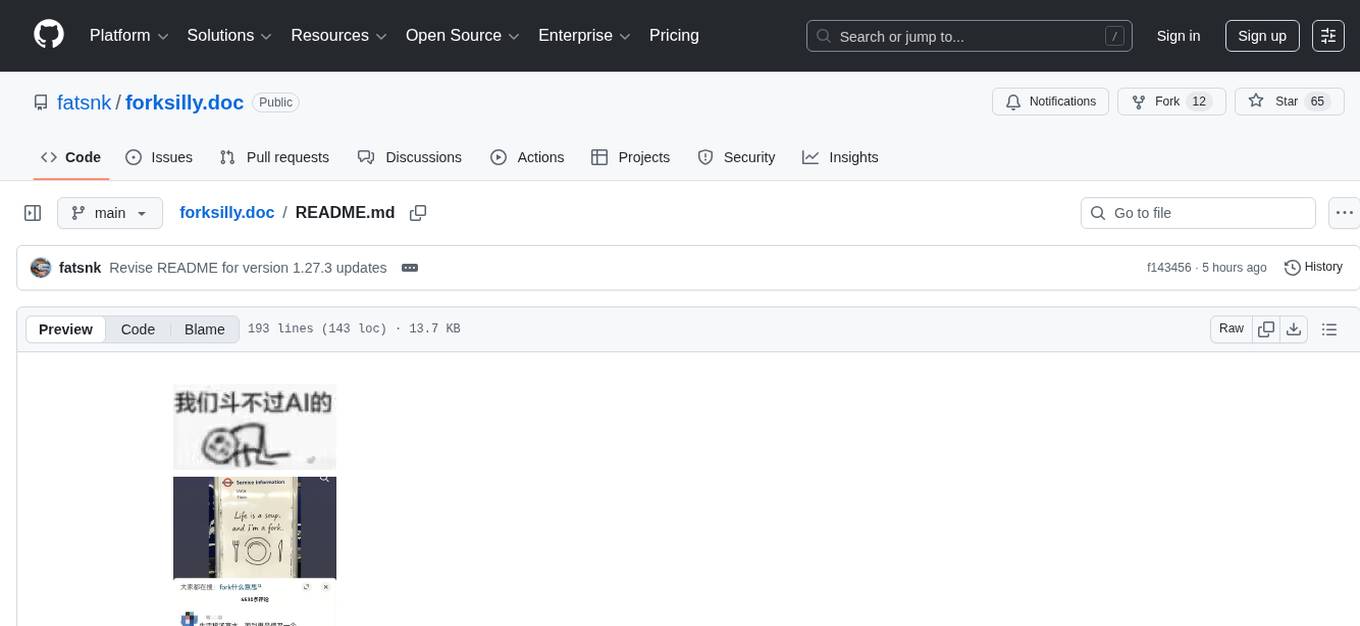
forksilly.doc
ForkSilly.doc is a repository mainly for storing documentation of ForkSilly, an Android project developed using React Native/Expo. It is suitable for users with experience in SillyTavern. The project is self-shared and may not accept feature requests. It is designed for pure text cards, illustration cards, and Stable Diffusion text-image. It is compatible with SillyTavern V2 character cards, world books, regex, presets, and chat records. Users can import and export at any time. The tool supports various customization options such as chat font, background image, and quick toggle of preset entries. It also allows the use of various OpenAI-compatible APIs and provides built-in storage management features. Users can utilize text-image functionality and access free text-image services like pollinations.ai. Additionally, it supports Stable Diffusion text-image features and integration with silicon-based flow and Gemini embedding models. The tool does not support TTS or connecting to NAI.
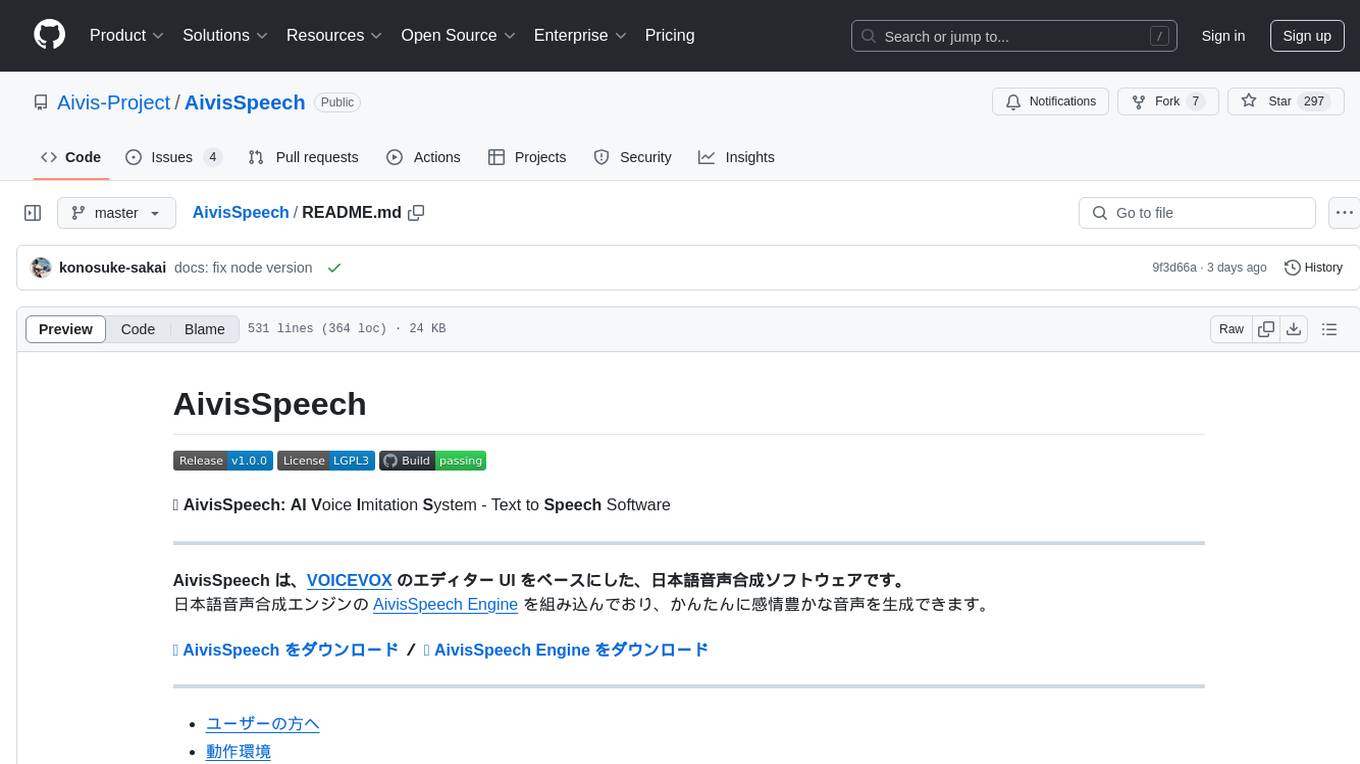
AivisSpeech
AivisSpeech is a Japanese text-to-speech software based on the VOICEVOX editor UI. It incorporates the AivisSpeech Engine for generating emotionally rich voices easily. It supports AIVMX format voice synthesis model files and specific model architectures like Style-Bert-VITS2. Users can download AivisSpeech and AivisSpeech Engine for Windows and macOS PCs, with minimum memory requirements specified. The development follows the latest version of VOICEVOX, focusing on minimal modifications, rebranding only where necessary, and avoiding refactoring. The project does not update documentation, maintain test code, or refactor unused features to prevent conflicts with VOICEVOX.
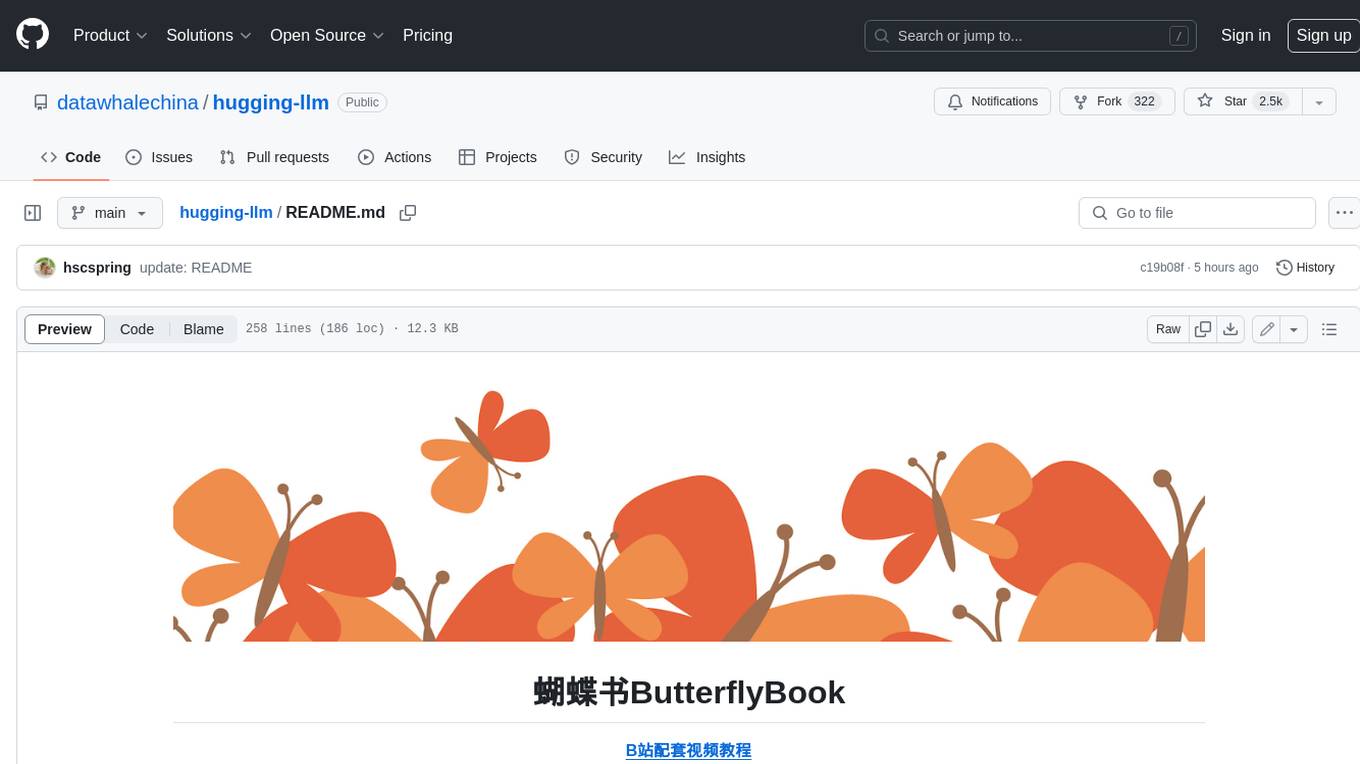
hugging-llm
HuggingLLM is a project that aims to introduce ChatGPT to a wider audience, particularly those interested in using the technology to create new products or applications. The project focuses on providing practical guidance on how to use ChatGPT-related APIs to create new features and applications. It also includes detailed background information and system design introductions for relevant tasks, as well as example code and implementation processes. The project is designed for individuals with some programming experience who are interested in using ChatGPT for practical applications, and it encourages users to experiment and create their own applications and demos.
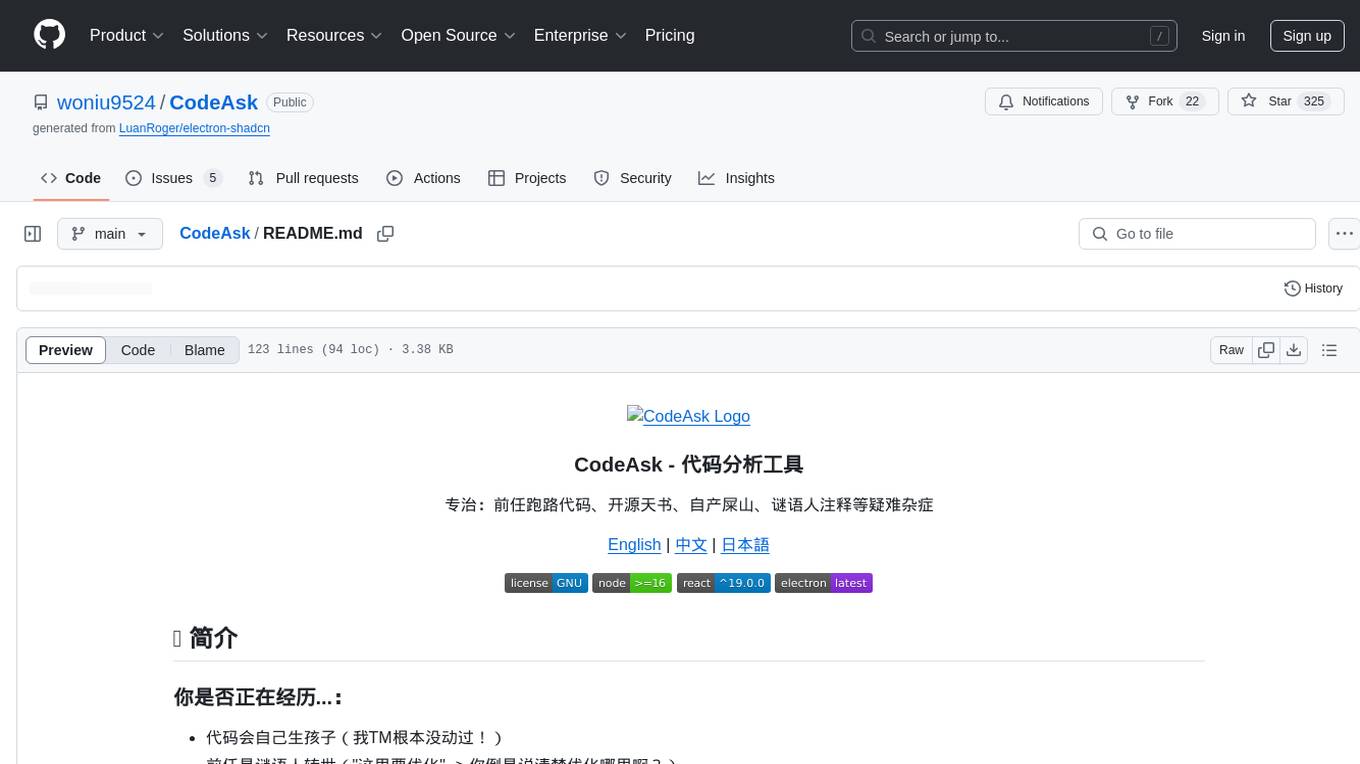
CodeAsk
CodeAsk is a code analysis tool designed to tackle complex issues such as code that seems to self-replicate, cryptic comments left by predecessors, messy and unclear code, and long-lasting temporary solutions. It offers intelligent code organization and analysis, security vulnerability detection, code quality assessment, and other interesting prompts to help users understand and work with legacy code more efficiently. The tool aims to translate 'legacy code mountains' into understandable language, creating an illusion of comprehension and facilitating knowledge transfer to new team members.

Avalonia-Assistant
Avalonia-Assistant is an open-source desktop intelligent assistant that aims to provide a user-friendly interactive experience based on the Avalonia UI framework and the integration of Semantic Kernel with OpenAI or other large LLM models. By utilizing Avalonia-Assistant, you can perform various desktop operations through text or voice commands, enhancing your productivity and daily office experience.

LabelQuick
LabelQuick_V2.0 is a fast image annotation tool designed and developed by the AI Horizon team. This version has been optimized and improved based on the previous version. It provides an intuitive interface and powerful annotation and segmentation functions to efficiently complete dataset annotation work. The tool supports video object tracking annotation, quick annotation by clicking, and various video operations. It introduces the SAM2 model for accurate and efficient object detection in video frames, reducing manual intervention and improving annotation quality. The tool is designed for Windows systems and requires a minimum of 6GB of memory.
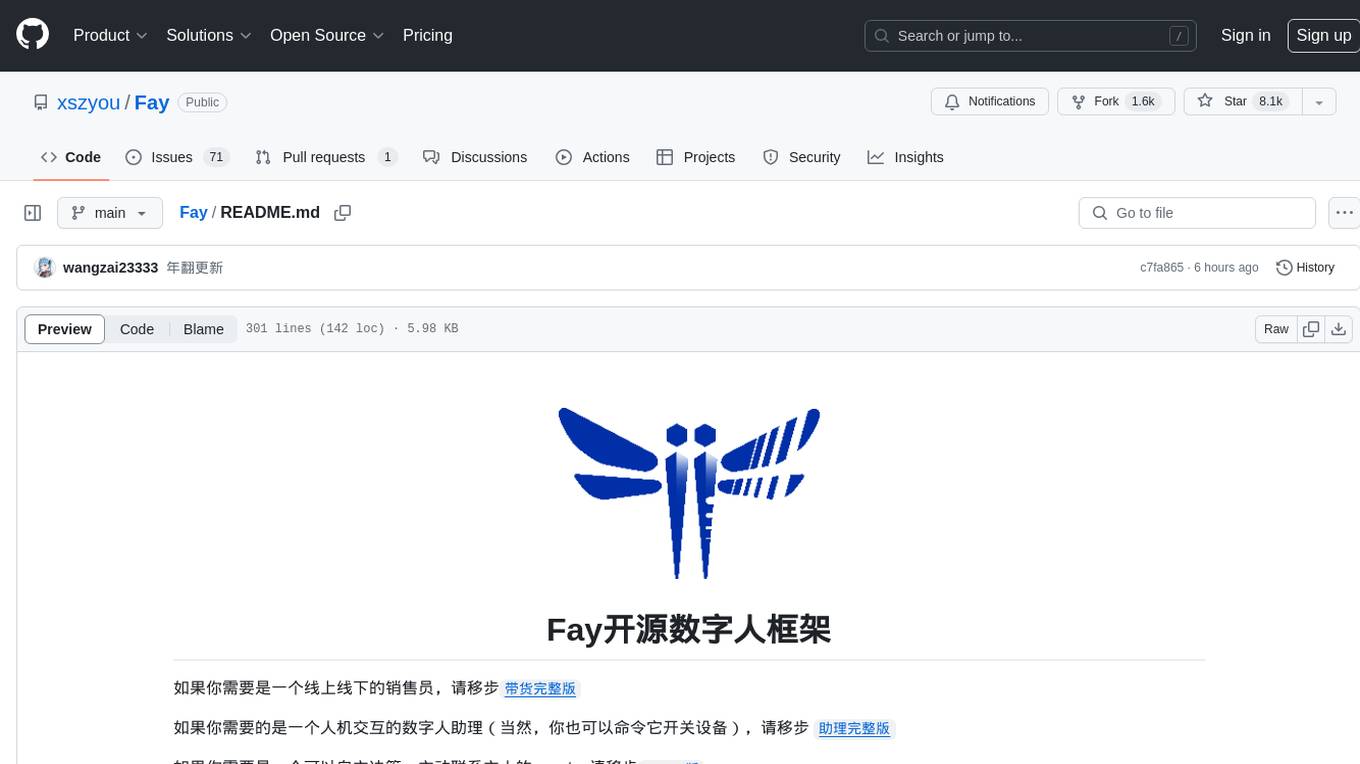
Fay
Fay is an open-source digital human framework that offers different versions for various purposes. The '带货完整版' is suitable for online and offline salespersons. The '助理完整版' serves as a human-machine interactive digital assistant that can also control devices upon command. The 'agent版' is designed to be an autonomous agent capable of making decisions and contacting its owner. The framework provides updates and improvements across its different versions, including features like emotion analysis integration, model optimizations, and compatibility enhancements. Users can access detailed documentation for each version through the provided links.
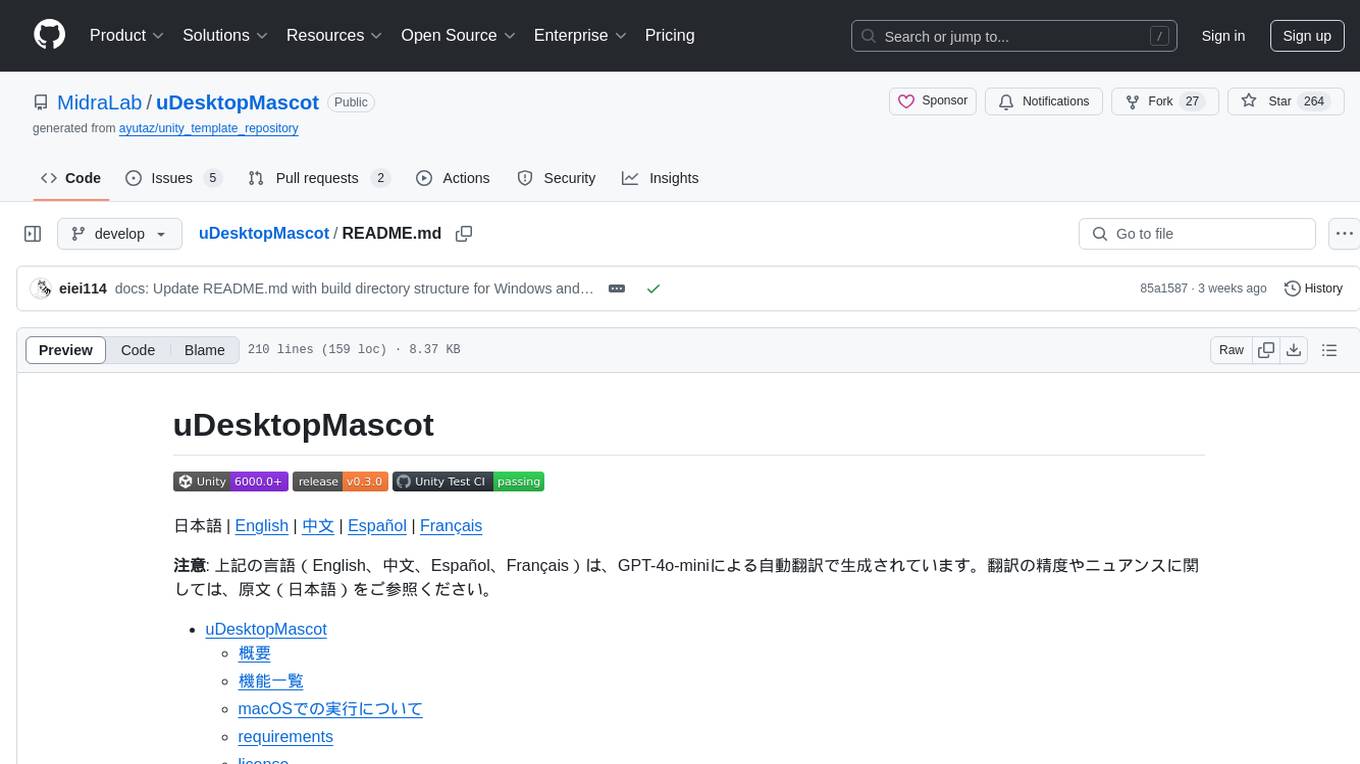
uDesktopMascot
uDesktopMascot is an open-source project for a desktop mascot application with a theme of 'freedom of creation'. It allows users to load and display VRM or GLB/FBX model files on the desktop, customize GUI colors and background images, and access various features through a menu screen. The application supports Windows 10/11 and macOS platforms.
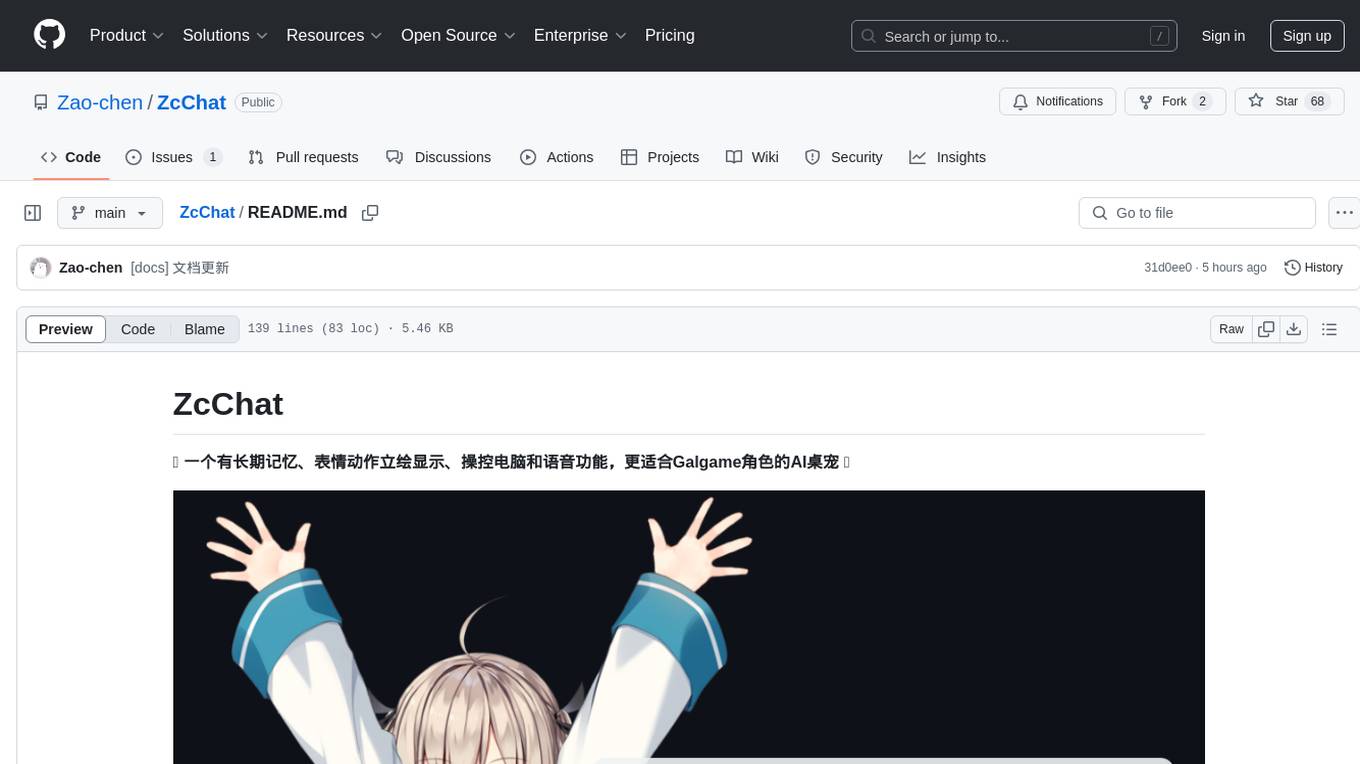
ZcChat
ZcChat is an AI desktop pet suitable for Galgame characters, featuring long-term memory, expressive actions, control over the computer, and voice functions. It utilizes Letta for AI long-term memory, Galgame-style character illustrations for more actions and expressions, and voice interaction with support for various voice synthesis tools like Vits. Users can configure characters, install Letta, set up voice synthesis and input, and control the pet to interact with the computer. The tool enhances visual and auditory experiences for users interested in AI desktop pets.
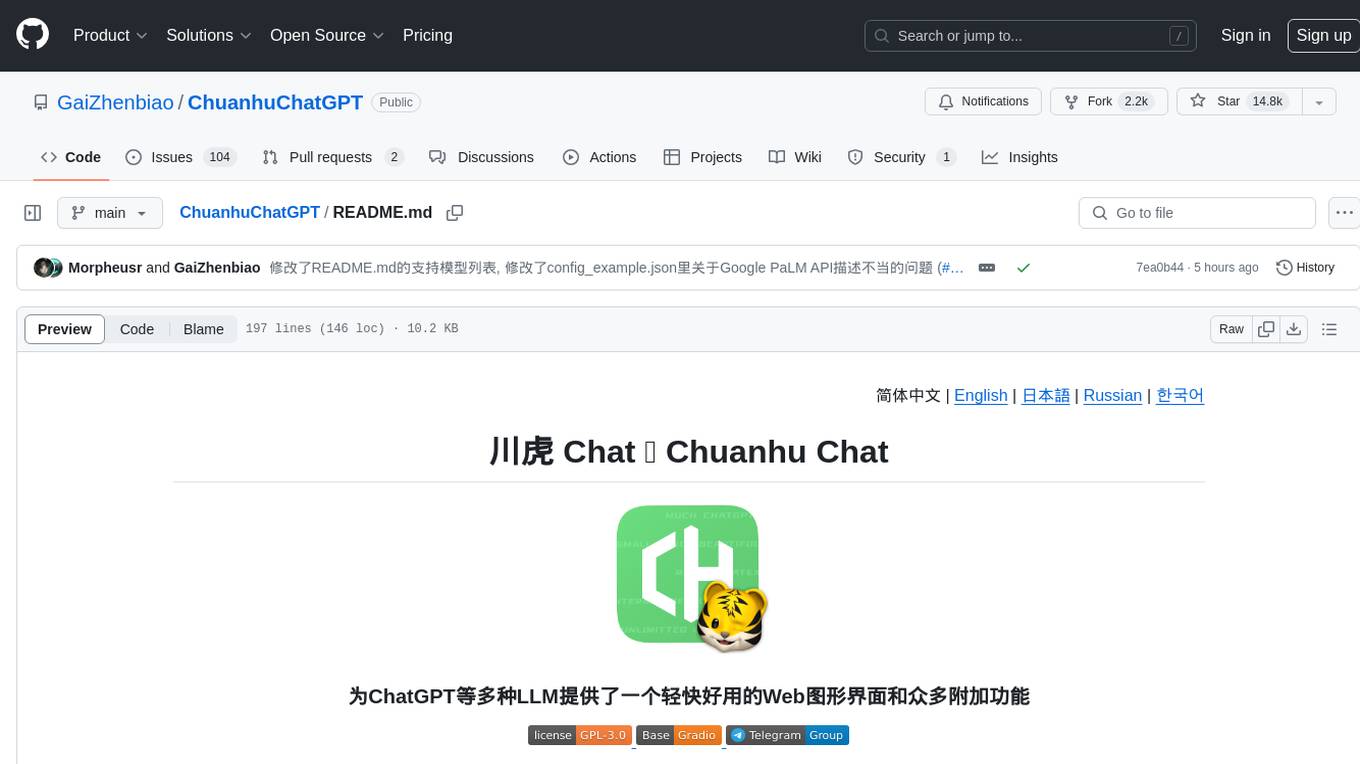
ChuanhuChatGPT
Chuanhu Chat is a user-friendly web graphical interface that provides various additional features for ChatGPT and other language models. It supports GPT-4, file-based question answering, local deployment of language models, online search, agent assistant, and fine-tuning. The tool offers a range of functionalities including auto-solving questions, online searching with network support, knowledge base for quick reading, local deployment of language models, GPT 3.5 fine-tuning, and custom model integration. It also features system prompts for effective role-playing, basic conversation capabilities with options to regenerate or delete dialogues, conversation history management with auto-saving and search functionalities, and a visually appealing user experience with themes, dark mode, LaTeX rendering, and PWA application support.
wealth-tracker
Wealth Tracker is a personal finance management tool designed to help users track their income, expenses, and investments in one place. With intuitive features and customizable categories, users can easily monitor their financial health and make informed decisions. The tool provides detailed reports and visualizations to analyze spending patterns and set financial goals. Whether you are budgeting, saving for a big purchase, or planning for retirement, Wealth Tracker offers a comprehensive solution to manage your money effectively.
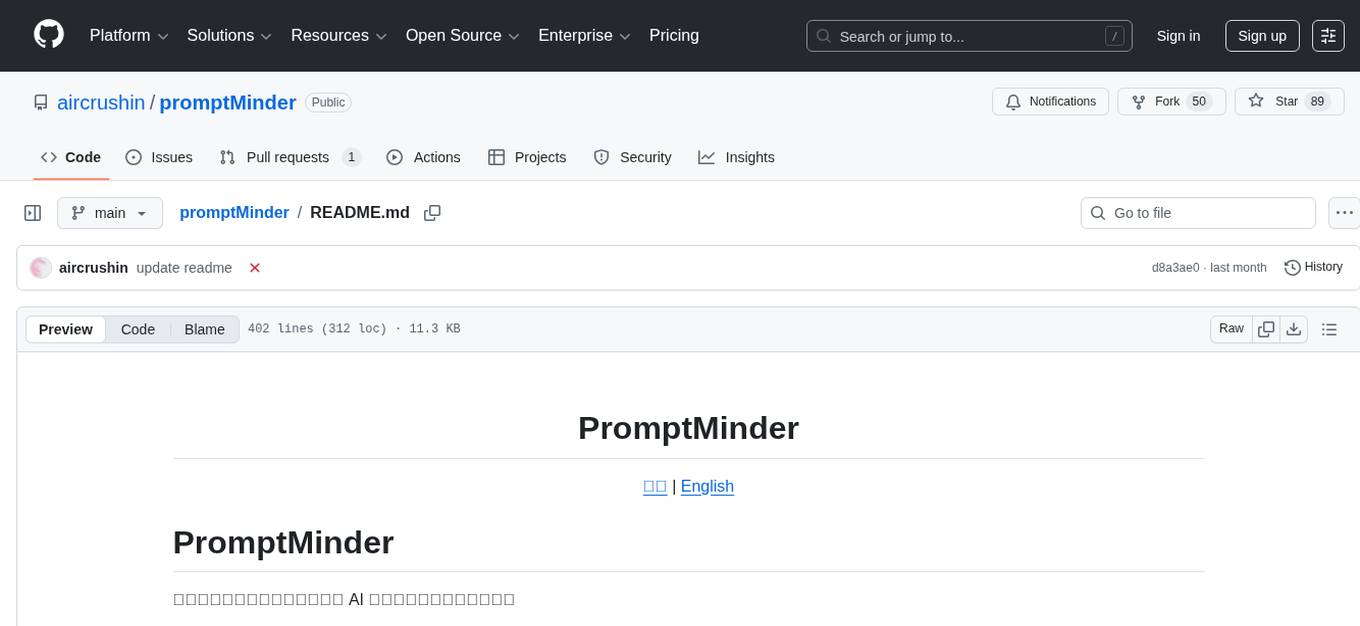
promptMinder
PromptMinder is a professional prompt word management platform that simplifies and enhances AI prompt word management. It features prompt word version control with support for version tracking and history viewing, diff comparison similar to Git for quick identification of prompt word updates, customizable tagging for quick categorization and retrieval, support for private and public prompt words, integration of AI models for intelligent prompt word generation, team collaboration with team creation, member management, and permission control, community contribution feature with audit and publishing process. The platform also offers a responsive design for mobile devices, internationalization support for Chinese and English languages, modern interface based on Shadcn UI, intelligent search and filtering functionality, and convenient copy and share features. It is built for high performance using Next.js 16 + React 19, with security authentication provided by Clerk, reliable storage using Supabase + PostgreSQL database, and easy deployment supporting Vercel and Zeabur one-click deployment.
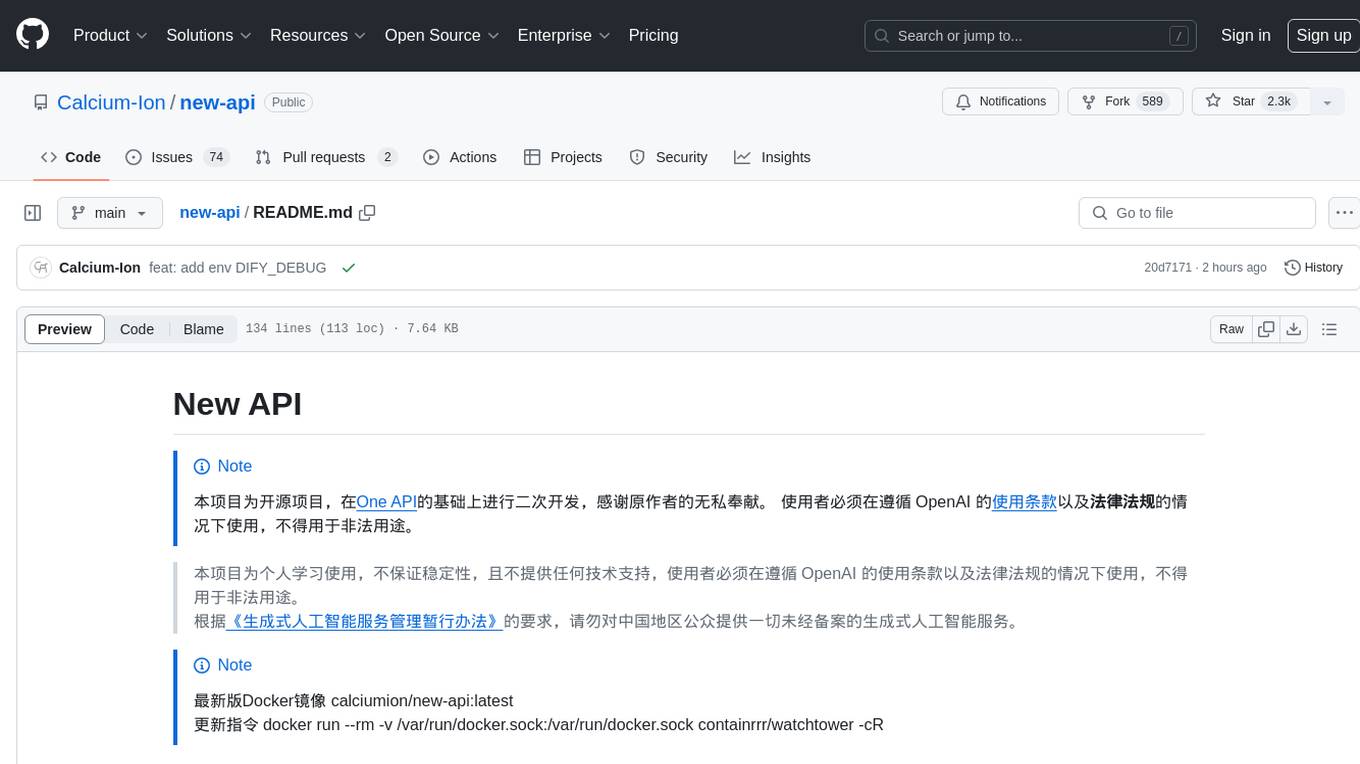
new-api
New API is an open-source project based on One API with additional features and improvements. It offers a new UI interface, supports Midjourney-Proxy(Plus) interface, online recharge functionality, model-based charging, channel weight randomization, data dashboard, token-controlled models, Telegram authorization login, Suno API support, Rerank model integration, and various third-party models. Users can customize models, retry channels, and configure caching settings. The deployment can be done using Docker with SQLite or MySQL databases. The project provides documentation for Midjourney and Suno interfaces, and it is suitable for AI enthusiasts and developers looking to enhance AI capabilities.
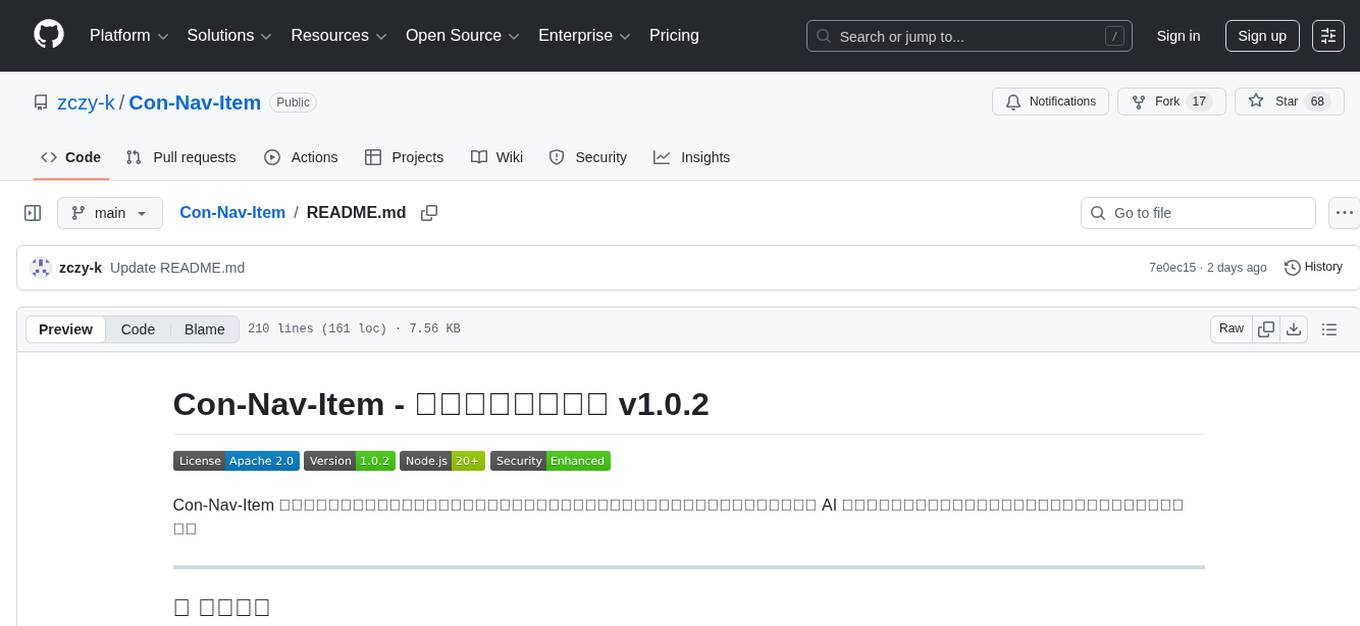
Con-Nav-Item
Con-Nav-Item is a modern personal navigation system designed for digital workers. It is not just a link bookmark but also an all-in-one workspace integrated with AI smart generation, multi-device synchronization, card-based management, and deep browser integration.
For similar tasks

chatgpt-webui
ChatGPT WebUI is a user-friendly web graphical interface for various LLMs like ChatGPT, providing simplified features such as core ChatGPT conversation and document retrieval dialogues. It has been optimized for better RAG retrieval accuracy and supports various search engines. Users can deploy local language models easily and interact with different LLMs like GPT-4, Azure OpenAI, and more. The tool offers powerful functionalities like GPT4 API configuration, system prompt setup for role-playing, and basic conversation features. It also provides a history of conversations, customization options, and a seamless user experience with themes, dark mode, and PWA installation support.
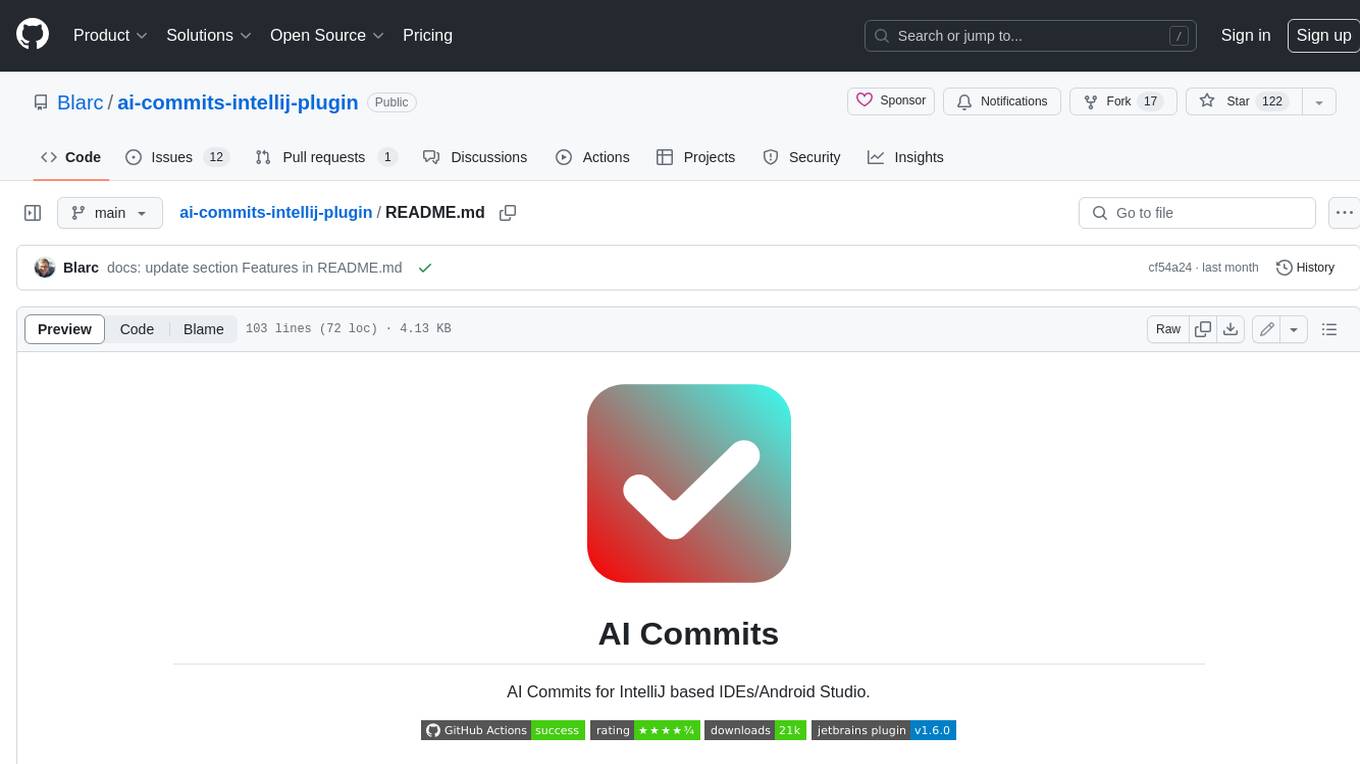
ai-commits-intellij-plugin
AI Commits is a plugin for IntelliJ-based IDEs and Android Studio that generates commit messages using git diff and OpenAI. It offers features such as generating commit messages from diff using OpenAI API, computing diff only from selected files and lines in the commit dialog, creating custom prompts for commit message generation, using predefined variables and hints to customize prompts, choosing any of the models available in OpenAI API, setting OpenAI network proxy, and setting custom OpenAI compatible API endpoint.
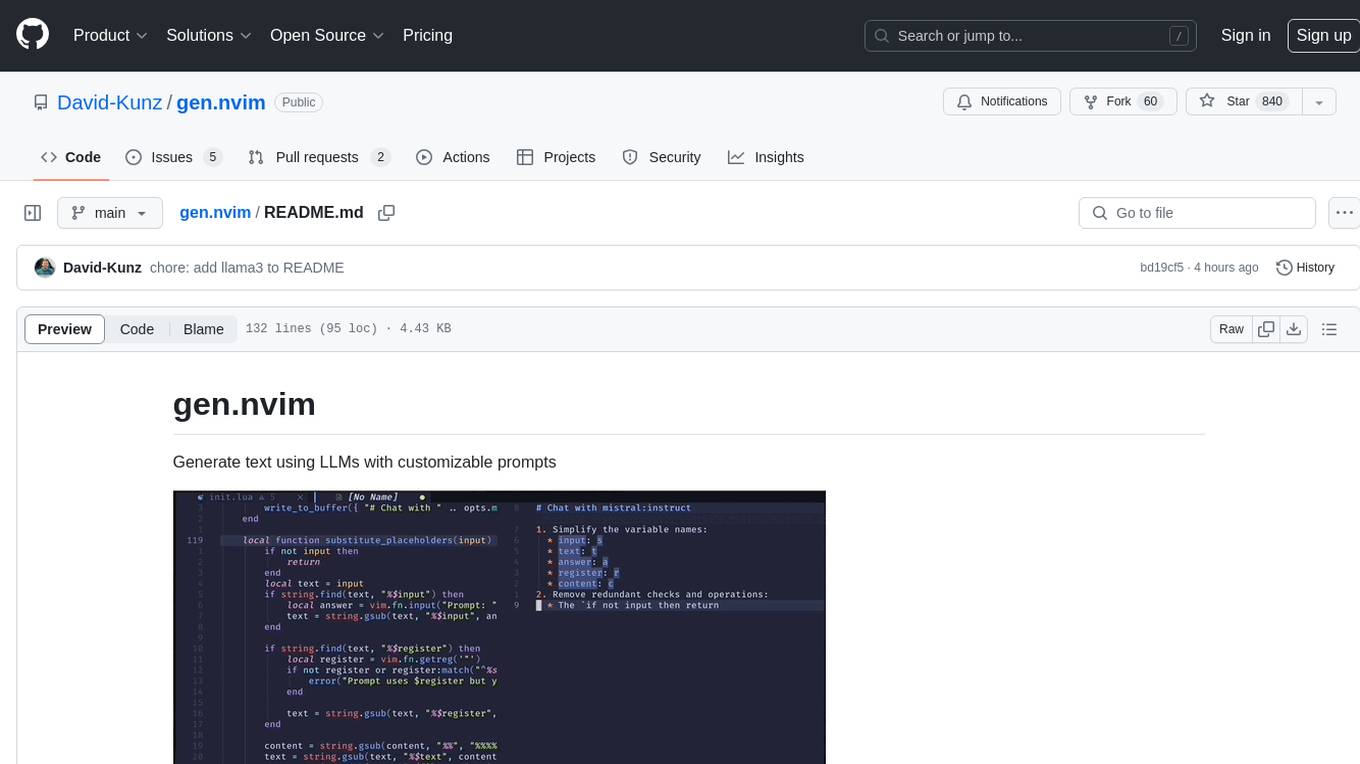
gen.nvim
gen.nvim is a tool that allows users to generate text using Language Models (LLMs) with customizable prompts. It requires Ollama with models like `llama3`, `mistral`, or `zephyr`, along with Curl for installation. Users can use the `Gen` command to generate text based on predefined or custom prompts. The tool provides key maps for easy invocation and allows for follow-up questions during conversations. Additionally, users can select a model from a list of installed models and customize prompts as needed.
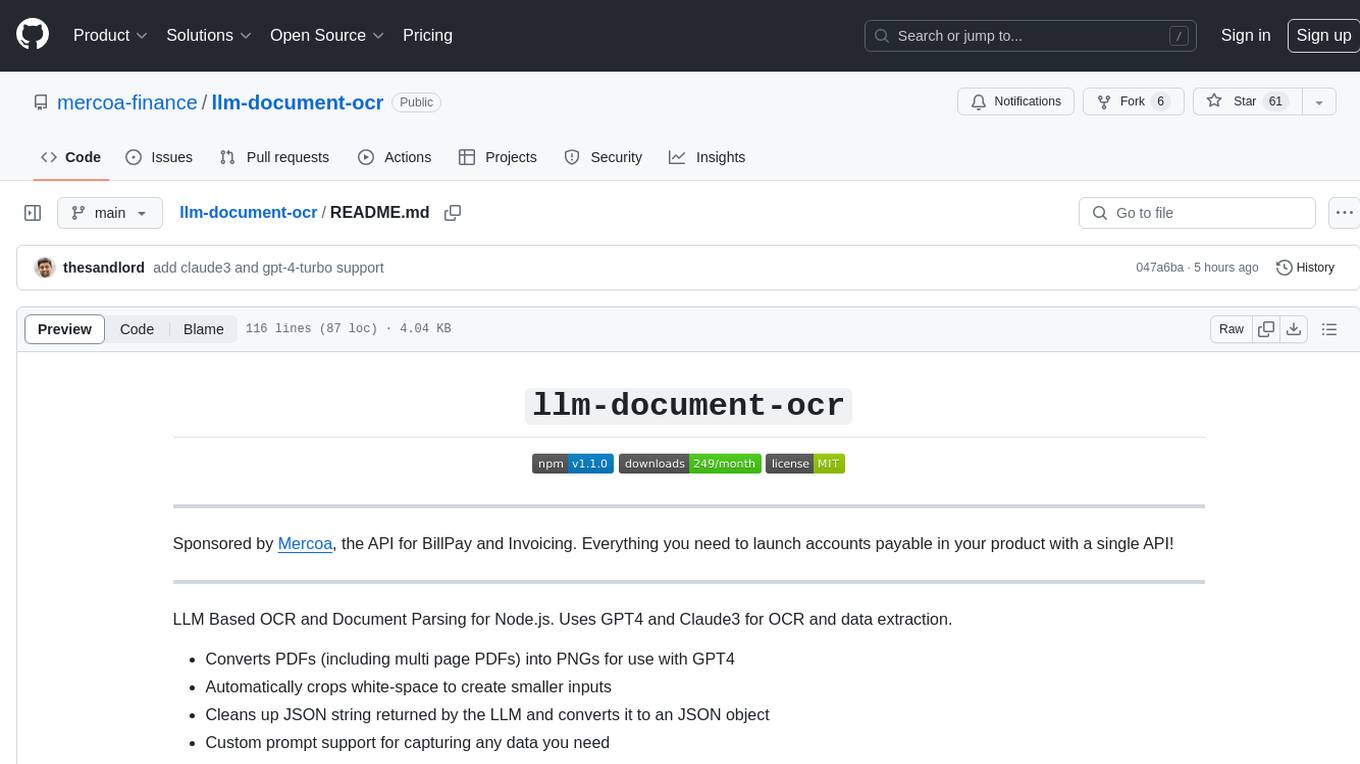
llm-document-ocr
LLM Document OCR is a Node.js tool that utilizes GPT4 and Claude3 for OCR and data extraction. It converts PDFs into PNGs, crops white-space, cleans up JSON strings, and supports various image formats. Users can customize prompts for data extraction. The tool is sponsored by Mercoa, offering API for BillPay and Invoicing.
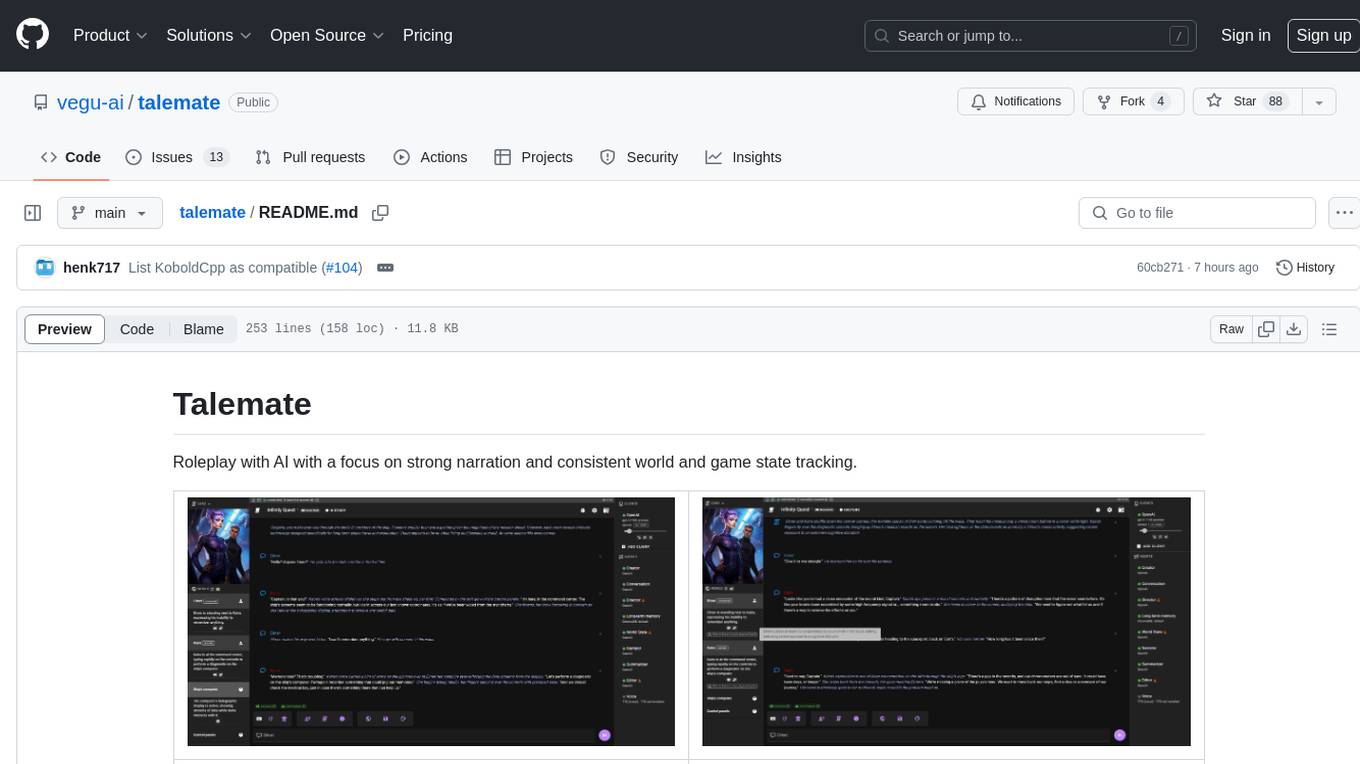
talemate
Talemate is a roleplay tool that allows users to interact with AI agents for dialogue, narration, summarization, direction, editing, world state management, character/scenario creation, text-to-speech, and visual generation. It supports multiple AI clients and APIs, offers long-term memory using ChromaDB, and provides tools for managing NPCs, AI-assisted character creation, and scenario creation. Users can customize prompts using Jinja2 templates and benefit from a modern, responsive UI. The tool also integrates with Runpod for enhanced functionality.
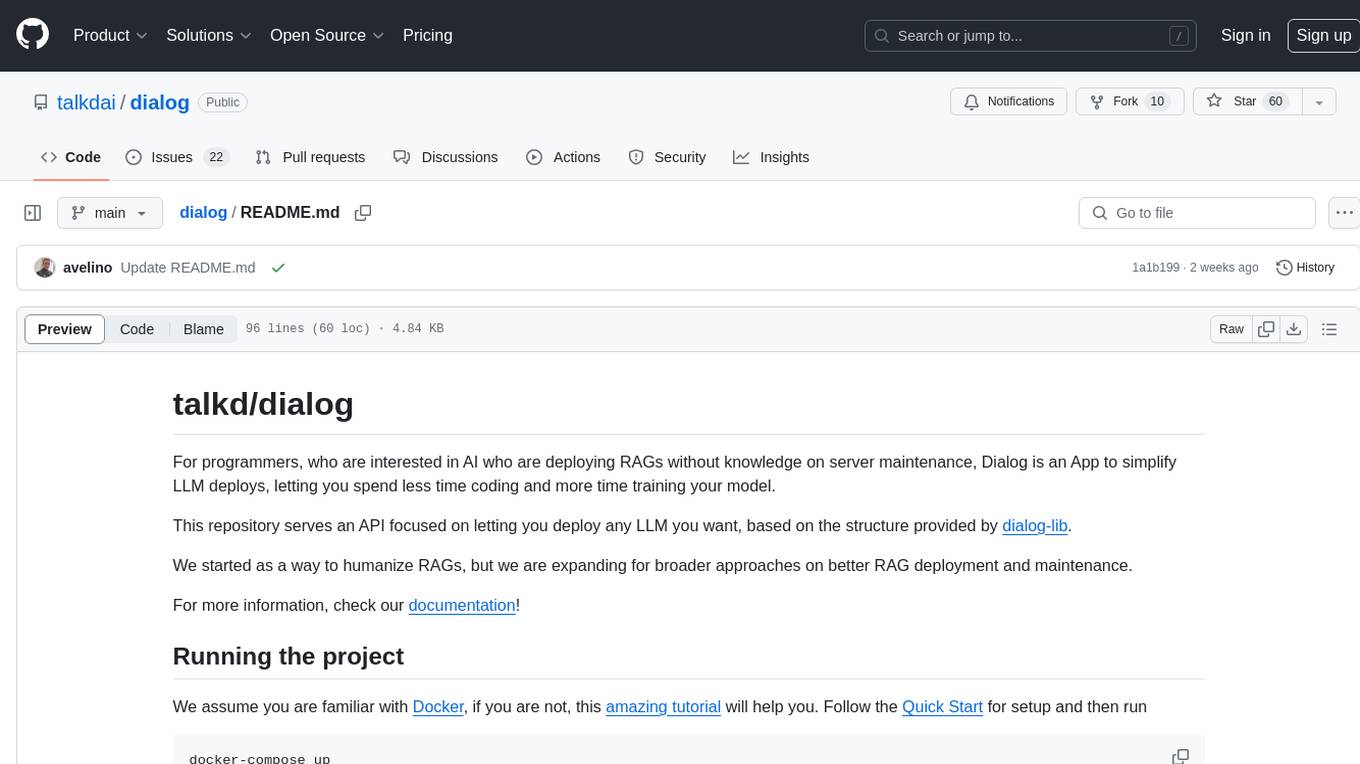
dialog
Dialog is an API-focused tool designed to simplify the deployment of Large Language Models (LLMs) for programmers interested in AI. It allows users to deploy any LLM based on the structure provided by dialog-lib, enabling them to spend less time coding and more time training their models. The tool aims to humanize Retrieval-Augmented Generative Models (RAGs) and offers features for better RAG deployment and maintenance. Dialog requires a knowledge base in CSV format and a prompt configuration in TOML format to function effectively. It provides functionalities for loading data into the database, processing conversations, and connecting to the LLM, with options to customize prompts and parameters. The tool also requires specific environment variables for setup and configuration.
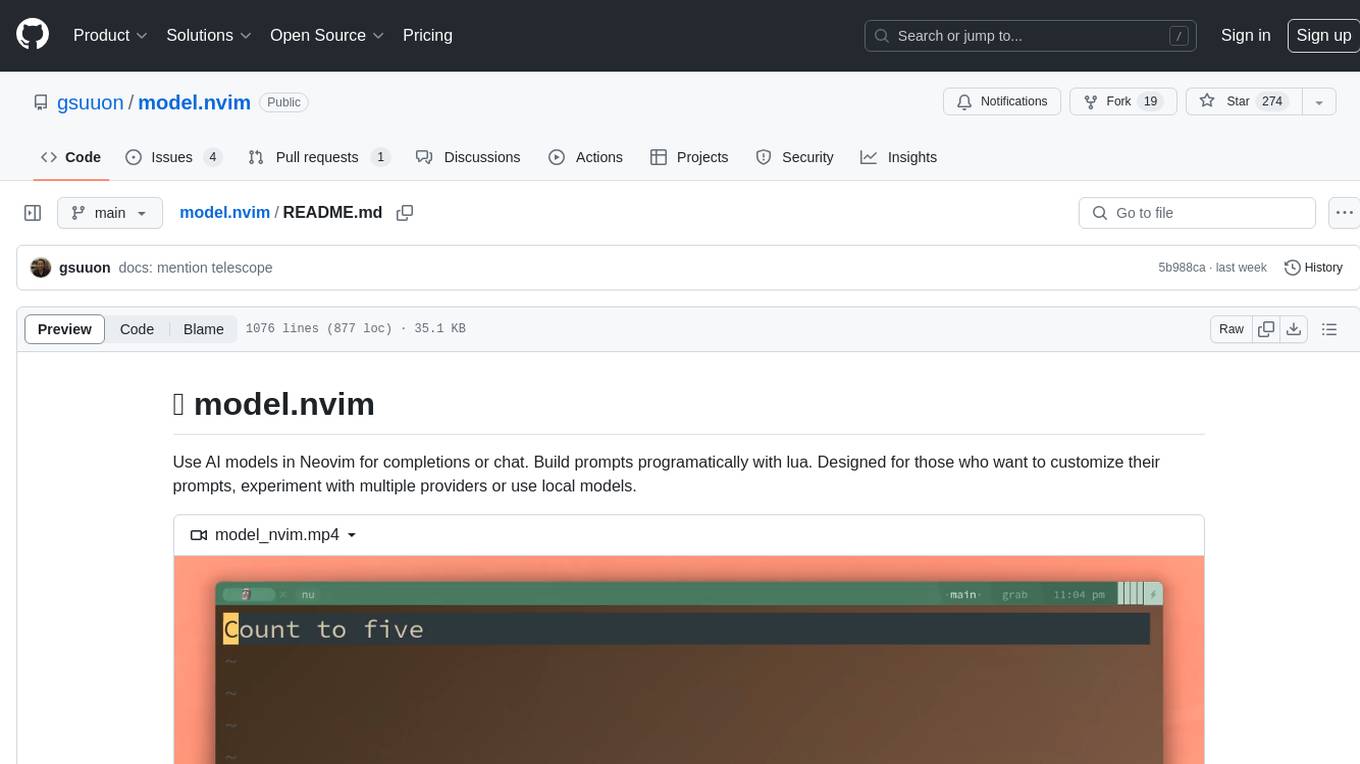
model.nvim
model.nvim is a tool designed for Neovim users who want to utilize AI models for completions or chat within their text editor. It allows users to build prompts programmatically with Lua, customize prompts, experiment with multiple providers, and use both hosted and local models. The tool supports features like provider agnosticism, programmatic prompts in Lua, async and multistep prompts, streaming completions, and chat functionality in 'mchat' filetype buffer. Users can customize prompts, manage responses, and context, and utilize various providers like OpenAI ChatGPT, Google PaLM, llama.cpp, ollama, and more. The tool also supports treesitter highlights and folds for chat buffers.
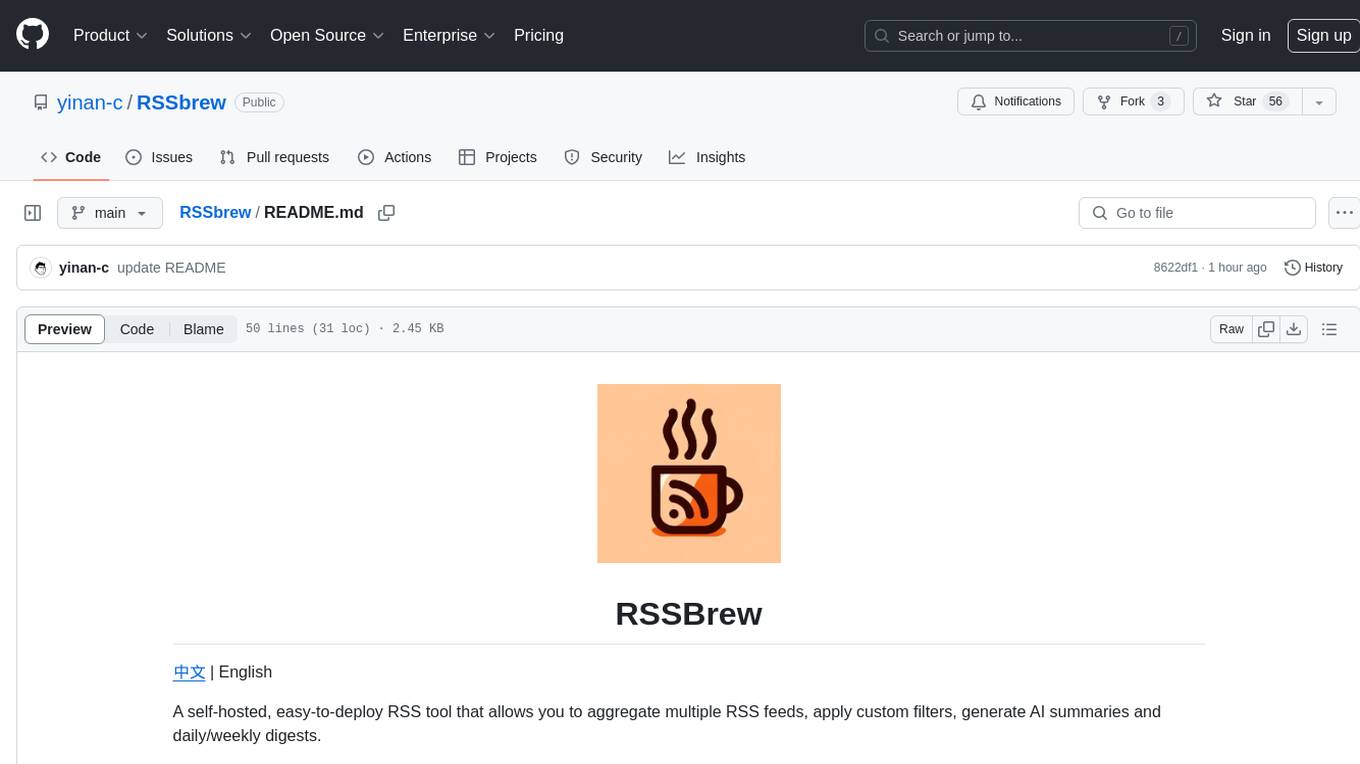
RSSbrew
RSSBrew is a self-hosted RSS tool designed for aggregating multiple RSS feeds, applying custom filters, and generating AI summaries. It allows users to control content through custom filters based on Link, Title, and Description, with various match types and relationship operators. Users can easily combine multiple feeds into a single processed feed and use AI for article summarization and digest creation. The tool supports Docker deployment and regular installation, with ongoing documentation and development. Licensed under AGPL-3.0, RSSBrew is a versatile tool for managing and summarizing RSS content.
For similar jobs

weave
Weave is a toolkit for developing Generative AI applications, built by Weights & Biases. With Weave, you can log and debug language model inputs, outputs, and traces; build rigorous, apples-to-apples evaluations for language model use cases; and organize all the information generated across the LLM workflow, from experimentation to evaluations to production. Weave aims to bring rigor, best-practices, and composability to the inherently experimental process of developing Generative AI software, without introducing cognitive overhead.

LLMStack
LLMStack is a no-code platform for building generative AI agents, workflows, and chatbots. It allows users to connect their own data, internal tools, and GPT-powered models without any coding experience. LLMStack can be deployed to the cloud or on-premise and can be accessed via HTTP API or triggered from Slack or Discord.

VisionCraft
The VisionCraft API is a free API for using over 100 different AI models. From images to sound.

kaito
Kaito is an operator that automates the AI/ML inference model deployment in a Kubernetes cluster. It manages large model files using container images, avoids tuning deployment parameters to fit GPU hardware by providing preset configurations, auto-provisions GPU nodes based on model requirements, and hosts large model images in the public Microsoft Container Registry (MCR) if the license allows. Using Kaito, the workflow of onboarding large AI inference models in Kubernetes is largely simplified.

PyRIT
PyRIT is an open access automation framework designed to empower security professionals and ML engineers to red team foundation models and their applications. It automates AI Red Teaming tasks to allow operators to focus on more complicated and time-consuming tasks and can also identify security harms such as misuse (e.g., malware generation, jailbreaking), and privacy harms (e.g., identity theft). The goal is to allow researchers to have a baseline of how well their model and entire inference pipeline is doing against different harm categories and to be able to compare that baseline to future iterations of their model. This allows them to have empirical data on how well their model is doing today, and detect any degradation of performance based on future improvements.

tabby
Tabby is a self-hosted AI coding assistant, offering an open-source and on-premises alternative to GitHub Copilot. It boasts several key features: * Self-contained, with no need for a DBMS or cloud service. * OpenAPI interface, easy to integrate with existing infrastructure (e.g Cloud IDE). * Supports consumer-grade GPUs.

spear
SPEAR (Simulator for Photorealistic Embodied AI Research) is a powerful tool for training embodied agents. It features 300 unique virtual indoor environments with 2,566 unique rooms and 17,234 unique objects that can be manipulated individually. Each environment is designed by a professional artist and features detailed geometry, photorealistic materials, and a unique floor plan and object layout. SPEAR is implemented as Unreal Engine assets and provides an OpenAI Gym interface for interacting with the environments via Python.

Magick
Magick is a groundbreaking visual AIDE (Artificial Intelligence Development Environment) for no-code data pipelines and multimodal agents. Magick can connect to other services and comes with nodes and templates well-suited for intelligent agents, chatbots, complex reasoning systems and realistic characters.






